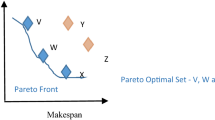Abstract
Efficient workflow scheduling in modern cloud environment involves optimization of various conflictive objectives like execution performance (time), reliability, energy consumption etc. Despite this trend, numerous heuristics have been devoted to workflow scheduling mainly focused on the optimization of makespan (execution time) only without giving much attention on other important objectives. Reducing energy consumption is the major concern as it brings several important benefits like reduction in the operating costs, increase in the system reliability and environmental protection. Moreover, the compute processors in cloud are not failure free. Any kind of failure can be critical for an application. Hence in this paper, we proposed the multi-objective NSGA-II based scheduling algorithm for workflow applications with the aim to optimize three conflicting criterion simultaneously: makespan\execution time, reliability and energy consumption for executing the workflow application in cloud environment. In order to reduce the computation complexity of the algorithm, we used the efficient non-domination level update mechanism rather than applying the non-domination sorting from the scratch each time. The simulation analysis of the proposed algorithm on CloudSim toolkit shows that the Pareto optimal solutions obtained have good convergence, uniform diversity and computational efficiency.





Similar content being viewed by others
References
Bansal JC, Sharma H, Jadon SS, Clerc M (2014) Spider monkey optimization algorithm for numerical optimization. Memetic Comput 6(1):31–47
Calheiros RN, Ranjan R, Beloglazov A, De Rose CA, Buyya R (2011) CloudSim: a toolkit for modeling and simulation of cloud computing environments and evaluation of resource provisioning algorithms. Softw Pract Exp 41(1):23–50
Coello CAC, Pulido GT, Lechuga MS (2004) Handling multiple objectives with particle swarm optimization. IEEE Trans Evol Comput 8(3):256–279
Coutinho F, de Carvalho LAV, Santana R (2011) A workflow scheduling algorithm for optimizing energy-efficient grid resources usage. In: 2011 IEEE ninth international conference on dependable, autonomic and secure computing (DASC), IEEE, pp 642–649
Deb K, Pratap A, Agarwal S, Meyarivan TAMT (2002) A fast and elitist multiobjective genetic algorithm: NSGA-II. IEEE Trans Evolut Comput 6(2):182–197
Dolas DR, Jaybhaye MD, Deshmukh SD (2014) Estimation the system reliability using weibull distribution. Int Proc Econ Dev Res 75:144
Forrest W (2008) How to cut data centre carbon emissions? Website, December
Garey MR, Johnson DS (2002) Computers and intractability, vol 29. wh freeman, New York
Garg R, Singh AK (2013) Multi-objective workflow grid scheduling using ε-fuzzy dominance sort based discrete particle swarm optimization. J Supercomput (Springer) SCI 68(2):709–732
Garg R, Singh A (2014) Fault tolerant task scheduling on computational grid using checkpointing under transient faults. Arab J Sci Eng 39(12):8775–8791
Garg R, Singh AK (2015) Adaptive workflow scheduling in grid computing based on dynamic resource availability. Eng Sci Technol Int J 18(2):256–269
Garg R, Singh A (2016) Energy-aware workflow scheduling in grid under QoS constraints. Arab J Sci Eng 41(2):495–511
Garraghan P, Townend P, Xu J (2014) An empirical failure-analysis of a large-scale cloud computing environment. In: 2014 IEEE 15th international symposium on High-assurance systems engineering (HASE), IEEE, pp 113–120
Guo S, Huang HZ, Wang Z, Xie M (2011) Grid service reliability modeling and optimal task scheduling considering fault recovery. IEEE Trans Reliab 60(1):263–274
He X, Sun X, Von Laszewski G (2003) QoS guided min-min heuristic for grid task scheduling. J Comput Sci Technol 18(4):442–451
Jadon SS, Bansal JC, Tiwari R, Sharma H (2014) Artificial bee colony algorithm with global and local neighborhoods. Int J Syst Assur Eng Manag, 1–13. doi:10.1007/s13198-014-0286-6
Jadon SS, Tiwari R, Sharma H, Bansal JC (2017) Hybrid artificial bee colony algorithm with differential evolution. Appl Soft Comput 58:11–24
Kim KH, Beloglazov A, Buyya R (2011a) Power aware provisioning of virtual machines for real? Time cloud services. Concurr Comput 23(13):1491–1505
Kim KH, Beloglazov A, Buyya R (2011b) Power aware provisioning of virtual machines for real? Time cloud services. Concurr Comput 23(13):1491–1505
Koomey JG (2007) Estimating total power consumption by servers in the US and the world. http://sites.amd.com/de/Documents/svrpwrusecompletefinal.pdf
Li K, Deb K, Zhang Q, Kwong S (2014) Efficient non-domination level update approach for steady-state evolutionary multiobjective optimization. Department of Electrical and Computer Engineering, Michigan State University, East Lansing, USA, Tech. Rep. COIN Report, (2014014)
Minas L, Ellison B (2009) Energy efficiency for information technology: how to reduce power consumption in servers and data centers. Intel Press
Sadiku MN, Musa SM, Momoh OD (2014) Cloud computing: opportunities and challenges. IEEE Potentials 33(1):34–36
Sharma K, Chhamunya V, Gupta PC, Sharma H, Bansal JC (2015) Fitness based particle swarm optimization. Int. J. Syst Assur Eng Manag 6(3):319–329
Sharma H, Bansal JC, Arya KV, Yang XS (2016) Lévy flight artificial bee colony algorithm. Int J Syst Sci 47(11):2652–2670
Tang X, Li K, Li R, Veeravalli B (2010) Reliability-aware scheduling strategy for heterogeneous distributed computing systems. J Parallel Distrib Comput 70(9):941–952
Topcuoglu H, Hariri S, Wu MY (2002) Performance-effective and low-complexity task scheduling for heterogeneous computing. IEEE Trans Parallel Distrib Syst 13(3):260–274
Tsiakkouri E, Sakellariou R, Zhao H, Dikaiakos M (2005) Scheduling workflows with budget constraints. In: Core GRID integration workshop, Pisa, Italy, pp 347–357
Yu J, Buyya R (2005) A taxonomy of workflow management systems for grid computing. J Grid Comput 3(3–4):171–200
Yu J, Buyya R (2006) Scheduling scientific workflow applications with deadline and budget constraints using genetic algorithms. Sci Program 14(3–4):217–230
Yu J, Kirley M, Buyya R (2007) Multi-objective planning for workflow execution on grids. In: Proceedings of the 8th IEEE/ACM international conference on grid computing, IEEE Computer Society, pp 10–17
Zitzler E (1999) Evolutionary algorithms for multiobjective optimization: methods and applications. Doctoral dissertation ETH 13398, Swiss Federal Institute of Technology (ETH), Zurich, Switzerland
Author information
Authors and Affiliations
Corresponding author
Rights and permissions
About this article
Cite this article
Rehani, N., Garg, R. Meta-heuristic based reliable and green workflow scheduling in cloud computing. Int J Syst Assur Eng Manag 9, 811–820 (2018). https://doi.org/10.1007/s13198-017-0659-8
Received:
Revised:
Published:
Issue Date:
DOI: https://doi.org/10.1007/s13198-017-0659-8




